
Where exactly does the disability community stand in this intellectual food fight that passes for politics these days?
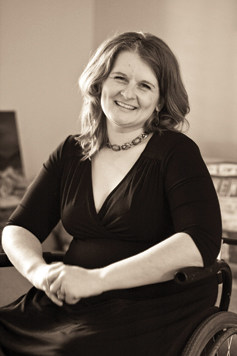
We live in an age of political hysteria. Everyone is shouting, pointing the finger at someone else, dismissing their political opponents as devious, conniving, and brain-dead fools. In the litany of the right — or at least the media right — Barack Obama is not just misguided, he’s a socialist, godless, runs a “secular socialist machine” (Newt Gingrich), is a secret Muslim, promotes class warfare, and isn’t even a real born-in-America American. In the litany of the left, the reigning rightists and their corporate overlords are Nazis, money-grubbing robber barons, “the grifter class” (Matt Taibbi), fearmongers, racists, or as Bill Maher summed up the slate of Republican presidential candidates, “ … like 14-year-old boys. There’s no ideology here. It’s just being a dick.”
My favorite expression of political vitriol came in a Facebook sighting of a sign held by an angry senior citizen: “A Nation of Sheep, Ruled by Wolves, Owned by Pigs.”
Where exactly does the disability community stand in this intellectual food fight that passes for politics these days?
Mostly on the sidelines, speaking of the past. According to the American Association of People with Disabilities Vote Project, approximately 27 million eligible voters with disabilities did not vote in the 2000 election. As the project concluded, if people with disabilities had voted in 2000 at the same rate as nondisabled voters, 4.6 million more votes would have been cast. If even a scattering of those were Democrats in Florida, we would have elected a different president.
So why haven’t people with disabilities voted in the past? Believe it or not, the answer seems to be largely access. Again, this data is slightly dated, but as of 2002, a General Accounting Office report concluded that 84 percent of all polling places had some sort of barrier to voters with mobility problems. Certainly these problems have decreased in the last 10 years, but even if 10 percent of polling places are inaccessible, it’s a subtle form of voter suppression.
The good news is the future may bode well for voters with disabilities. Accessible voting sites are on the upswing, and the state of Oregon recently passed legislation that allows people with disabilities to vote via state-supplied iPads in selected locations. If digital technology, plus another Oregon first, only-by-mail voting, ruled presidential elections, there would be no or damn little inaccessibility (see sidebar, page 29).
Assuming accessible voting will be the norm in the future, how do voters with disabilities vote? Is there a “disability bloc” in American politics? The conventional wisdom — or at least a reasonable premise — is that there is. In all but one of the previous five presidential elections, voters with disabilities favored the Democratic candidate. The most impressive margin was in 1996, when Clinton got a whopping 69 percent of the disability vote.
It only makes sense that disabled voters, like the poor and other disenfranchised groups, lean toward the party that created most of the nation’s social welfare programs, including Medicare, Medicaid, SSDI, and SSI, and just recently, the party of the Supreme Court-approved Patient Protection and Affordable Care Act, which may be the most important issue in the 2012 election, given the two parties hold diametrically opposed positions (see sidebar, page 34.)
But the question remains, are disabled voters simply taken for granted by the Democratic Party? Are we all conscious or unconscious participants in a kind of disabled group-think, a sense that we are entitled to government largesse because of our disabling conditions? Will we remain, at least in the eyes of the public and the media, a needy and dependent interest group? If that’s the case, it’s not a healthy reality or perception. A group that is thought of as monolithic and predictable in its views is easily dismissed in the cutthroat business of politics. Throw them a few crumbs, the cynics will say, make sure they can get into the voting booth, and they’ll vote the party line.
The Broad Spectrum of Disability Politics
To dispel this suspect notion of an unthinking, knee-jerk disability voting bloc, whether it’s real or not, I set out to pick the fertile minds of some political thinkers who mostly happened to be wheelchair users (“the chrome police,” as one quipped) and who scoff at the notion that they fit some cookie-cutter model of correct thinking. With no particular political agenda of my own, I looked for people with strong, well-articulated views who didn’t occupy the muddy middle, often the zone of expediency for slippery politicians. The idea here is to focus on political ideas — wildly divergent ideas — and not just brickbats and slogans. These people don’t mince words. They aren’t campaigning for any office, just the truth as they see it. Some of the views espoused, if you have a political pulse, will have you mumbling rhetorical take-downs under your breath and shaking your fist at this magazine. If not, I haven’t done my job.
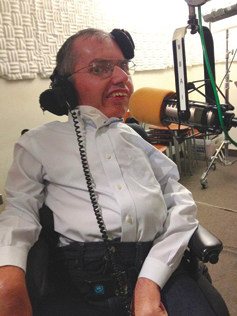
Bill Peace, academic and writer, identifies himself as a political radical. “People with disabilities are too diverse and self-interested and hopelessly splintered,” he says, “thus we have not as yet formed an effective political bloc in spite of much legislative success.” Fragmentation by disability — the MS people have their agenda, the autism lobby has theirs — invites collective impotency, he says.
Marta Russell, a disability rights activist and prolific writer on disability issues, identifies her political bent as “left, not liberal.” The “handicapped” vote, as it is still referred to, is all over the place — “blue, red, and green.” Not that it matters that much in the current circumstances. In the wake of the Citizen’s United-induced corporate campaign spending, money rules the day in politics. “The brazen power of the dollar in politics,” she says, “is shoving disabled people and other disadvantaged groups off the radar screen.”
But if your political prism is slightly more right tilting, you might think differently. This is best summed up by an observation made by Tk Small, an attorney with both a general and a disability practice in New York. “Of the people with disabilities who are politically active, a majority are on the left side. When I tell disabled people that I’m a Republican, they are visibly uncomfortable.” Small doesn’t think there is anything approaching a disability voting movement, left or right, but clearly, in a lot of people’s eyes, a disabled Republican is an odd duck.
What about a self-described disabled “Libertarian — swinging to the far right”? Carolyn Anne Anderson, paralyzed from a car accident when she was 17, now lives in Arizona raising two boys and works as an artist and writer. She has a master’s in disability studies and is starting work on a doctorate. What she loves about “the disability culture movement“ is that the people involved make up “a patchwork of diversity — no bias in gender, race, ethnicity, class, or sexual orientation.” At least until you come to the subject of politics. “I have learned,” she says, “to keep my comments to myself on Facebook, message boards, or general discussion unless I wish to be flamed or shut out.”
Anderson labels herself “far right,” but I think I found someone even further right, though I’m not sure how you measure these things. In any case, he’s one of the few of his persuasion who writes books and goes on television to propound his views. His name is Greg Perry. He lives outside Tulsa, Okla., and was born with only one leg and three fingers. Among dozens of books he’s penned on everything from computer tips to buying an automatic weapon online, he is also the author of Disabling America: The Unintended Consequences of the Government’s Protection of the Handicapped. Perry was too busy to talk but wished us well. “I realize,” he said via e-mail, “without my interview you’ll probably find nobody who will say that the ADA is evil — and that is the real shame.”
What About the ADA?
This brings us to perhaps the single most important and historic piece of legislation for people with disabilities — the ADA — which serves as a fitting litmus test for our free thinkers.
Perry is as anti-ADA as you can get. In his book he considers the ADA to be government coercion, a legislative act “that has its tentacular hold on virtually every element of American society.” It breeds resentment towards the disabled, from the over-regulated small business owner to the guy at the mall who is “forced to park far from the door even though the ADA-required spaces up front remain empty.”

Government mandates like the ADA, so his thinking goes, create a life-sustaining, and controlling, umbilical cord between disabled people and the state. The result of this, he says, is not more independence for the disabled, but less. “The ADA,” he writes, “forces changes that actually result in handicapped people becoming more dependent.”
Libertarian Anderson is not ready to trash the ADA, but questions the role of government in legislating individual rights. As an ADA coordinator “for a major university,” she saw rampant abuse of the law, like a student who was a German major but had her German language requirements waived due to a learning disability, “much to the horror of the German Studies department.”
Anderson comes to this conclusion. “I definitely believe that you cannot effectively legislate social change. You can force people to do ‘the right thing,’ which is sometimes effective and other times breeds resentment, more inequality, abuse, waste, and corruption.”
Russell, from a completely different angle, doesn’t see the ADA as evil, just inadequate. Though as civil rights legislation, it “expanded the public imagination,” it doesn’t address the much larger social problem involving people with disabilities. “There is systemic economic discrimination against disabled persons in a capitalist economy that the ADA cannot address or remedy. It is the liberal view that economic justice is possible through the enactment of civil rights laws geared to make discrimination against the law … [But] civil rights cannot solve the mass unemployment or lack of access experienced by disabled Americans.”
The marginalization is built right into the capitalist system, says Peace. “All the legislation in the world cannot remove the stigma associated with disability. People with a disability in capitalist societies are perceived to be an economic drain. Nonproductive beings that have no place — this social identity could not be worse.”
Whether the ADA has or has not improved the lives of disabled people, almost all of this brain trust senses a backlash at work in recent years. Perry says no backlash is complete until the whole act is deep-sixed. “If the ADA has done absolutely nothing to help employ the disabled, then get rid of it. Today by noon.”
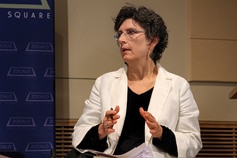
Peace sees a backlash, or at least a simple ignoring, of the law as inevitable. “There is absolutely no social demand for the law to be enforced,” he says. “I see an ADA violation every day I leave my home. No people without a direct connection to disability care one iota about the ADA. At best lip service is paid, but the spirit of the law is violated and demeaned daily. If a black person was denied entry onto the bus, there would be moral outrage. When I try and get on the bus via a wheelchair lift that is broken, there is no comparable outrage. People think, ‘Too bad for you.’
“Disability is thought to be a personal medical problem. Hence there is no mandate for disability rights — no social support from people without a disability.”
No Jobs, No Power?
The greatest proof that nothing much has changed in the post-ADA era lies in the area of employment. A 2010 Harris survey done for the Kessler Foundation and the National Organization on Disability concludes that among working-age people with disabilities, only 21 percent said they were employed full or part-time compared to 59 percent of those without disabilities. Equally revealing is the fact that 70 percent of corporations polled said they had diversity policies or programs, but only two-thirds of those included disability as a component.
The brutal fact is that in boom or bust times, under Democratic or Republican presidents, American businesses are not rushing to hire people with disabilities. And there is no law that says they have to. What, if anything, can be done to change things?
Russell sees no easy way out. “This disparity continues to exist because it is part of our economic system. There is a built-in unemployment rate to capitalism … and people, including many disabled people, are excluded from work in such a system.”
Peace is even more pessimistic. “Unemployment statistics have not changed nor will they in my lifetime. People with a disability are just not considered to be viable employees or parents or marriage material. This sort of unspoken bigotry is very difficult to overcome.”
The problem is government intrusion, Perry reiterates. “The free market,” he says, “always takes care of its customers’ needs. Where was all the free market support for the disabled before the ADA? The simple and correct answer is: all the disabled improvements that were needed were either in place or were underway.” He cites Microsoft as a company who created an accessible work space long before the ADA.
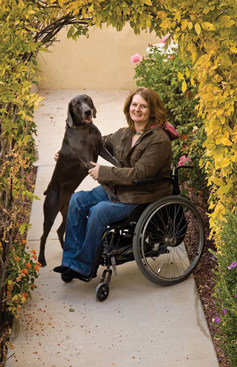
Anderson sees it differently: “The way that disabled folks — at least the physically disabled — are going to even the odds in employment is for there to be better advancements in skin care, cushion seating technology, transportation, adaptive equipment, etc., because even the best ADA compliance employer can’t manage with an employee who isn’t there.”
Small again brings the issue back to personal responsibility and initiative. The surfeit of government programs to provide for the disabled “discourages people from taking initiative,” he says. “Sure, there should be a safety net, but it shouldn’t be too secure.” And the safety net is only for those who truly need it. “If I were a paraplegic, I wouldn’t ask the government to do anything for me except deliver the mail.”
Small’s starting point: Stop blaming other people! “People with disabilities are definitely disenfranchised — and they blame it on somebody else. There is plenty of blame to go around, but no one takes responsibility. And that applies to the country collectively, not just people with disabilities.”
His solution is more imaginative programs to allow people to create their own opportunities. One example would be the idea of “empowerment zones”; for example, disabled people who start their own businesses would get incentives like tax breaks to get going. He likes ideas that encourage disabled people to take chances and build their own economic futures rather than always be in some co-dependent relationship with public programs.
“The government can play a role in promoting opportunity and self-reliance, but the government shouldn’t guarantee anything. The government shouldn’t be picking winners and losers in business and shouldn’t do it with individuals, either,” says Small.
In this age of rampant budget cutting, one classic leftist idea for employing disabled people still deserves mention. “The federal government,” explains Russell, “could legislate full employment, setting up a structure where jobs must be provided by government as a last resort for those wanting work.” This would both put people with disabilities to work and give them skills that could be transferred into the private sector. It would be expensive, demand a much different tax structure, but most importantly, demand a national political will that doesn’t seem to exist right now.
What’s Next?
Focusing of what might happen as opposed to what should happen, what will the status of the citizen/worker with a disability be in 20 years? The harshest prediction comes from Peace:
“Twenty years from now, the unemployment statistics for people with a disability will be worse or at best remain stagnant. If anything, I am more worried now than at any time in my life. If the Republicans win in the fall, I think a war on the poor and disabled will be waged — and in my estimation, people with a disability who came of age in the post-ADA era will not know how to cope, adapt, or fight for their civil rights.”
“Constructive conservative” Small sees the same writing on the wall, no matter who wins in this election cycle. Chances are good that “there is not going to be a social safety net [for people with disabilities] in 10 to 15 years.” The general posture could be something no one in the modern era has said to a person with a disability: “You’re on your own.”
The most hopeful view comes from Libertarian Anderson. “As other movements of ‘difference’ gain momentum and success — and I am closely watching the LGBT movement” — people with disabilities will gain, too. “And if the ones who have gone before — civil rights activists, feminists, and the like — gain progress, we can, too.”
Unlike many of the other contributors, Anderson believes in the system, flaws and all. “Our capitalist system / American / free-market /democratic system,” she concludes, “works in many ways to the benefit of those who are ‘outside the social norm’ much more than many countries in the world.”
Russell has the last say on our future. “I will say that this is a pivotal year for our nation as far as social policy and the economy go.” She has little faith in either Romney or Obama to extend the existing social contract, although Romney’s alignment with deficit hawks is more troublesome to her. Romney’s stated plans would require “extraordinarily large cuts,” so says the nonpartisan Center on Budget and Policy Priorities, in programs such as entitlements and discretionary programs. This doesn’t bode well for disabled people who survive on those services, in the same way a weak economy should make even an employed person with a disability fretful. When push comes to shove, is that employee a feel-good luxury or a necessity?
Of course, America’s economic future, and its impact on social policies, she adds, is now inextricably tied up with what happens tomorrow in Greece, Spain, China, and the halls of the German Bundestag. Russell concludes, “So as it goes, disabled people’s fate is wrapped up in the world’s …”
A pivotal year for our nation? Disabled people’s fate wrapped up in the world’s? Regardless of your condition or point of view, and barriers included, isn’t that enough incentive to go out and vote?
Think about it.

Voting in Oregon: Is This Our Future? Voting is a hassle for many Americans, disabled and nondisabled. In an age of myriad instantaneous ways of communicating, why do we still have to traipse down to the fire station or school cafeteria and mark a paper ballot?Voting-wise, everything is up to date in Oregon, especially for the physically impaired. Way back in 1998, the state switched to voting by mail in which all ballots for all elections are mailed in. Since 2010, Oregonians can also register to vote online, in the same way you can register for Medicare and a hundred other government services online. And in 2011, the state started a revolutionary iPad voting program for disabled voters.Election workers took iPads and portable printers around to nursing homes and community centers in five counties to assist disabled voters who weren’t able to access write-in ballots. Say you have limited eye sight or are a complete quad. The iPad can give you a huge print size to see clearly or a sip-and-puff device that will allow hands-free voting. It’s both novel and practical. A filled-out paper ballot is left behind so you know you haven’t been bamboozled.Hopefully, the day is not far off where disabled voters (and everyone else) can both register and vote online and if need be, call the iPad Squad to come by and help. Universal access, here we come.— A.R. Voting is a hassle for many Americans, disabled and nondisabled. In an age of myriad instantaneous ways of communicating, why do we still have to traipse down to the fire station or school cafeteria and mark a paper ballot?Voting-wise, everything is up to date in Oregon, especially for the physically impaired. Way back in 1998, the state switched to voting by mail in which all ballots for all elections are mailed in. Since 2010, Oregonians can also register to vote online, in the same way you can register for Medicare and a hundred other government services online. And in 2011, the state started a revolutionary iPad voting program for disabled voters.Election workers took iPads and portable printers around to nursing homes and community centers in five counties to assist disabled voters who weren’t able to access write-in ballots. Say you have limited eye sight or are a complete quad. The iPad can give you a huge print size to see clearly or a sip-and-puff device that will allow hands-free voting. It’s both novel and practical. A filled-out paper ballot is left behind so you know you haven’t been bamboozled.Hopefully, the day is not far off where disabled voters (and everyone else) can both register and vote online and if need be, call the iPad Squad to come by and help. Universal access, here we come.— A.R. |
| Political Football?: The Affordable Care Act by Tim Gilmer
Amid all the talk of the nation’s economy, the most important issue in 2012 for voters with disabilities may very well be the Patient Protection and Affordable Care Act. NEW MOBILITY sought out differing views on the future of this groundbreaking legislation from two experts on health care issues: Mark Perriello, president and CEO, American Association of People with Disabilities; and Steven James Tingus, former Deputy Assistant Secretary in the U.S. Department of Health and Human Services, and prior to that, director of the National Institute on Disability and Rehabilitation Research. Q. Mr. Perriello, what are the most important provisions in the Affordable Care Act for people with disabilities? MP: First, the elimination of pre-existing conditions is a fundamental change in health care that will prevent discrimination by insurers, which will also provide for more employment opportunities for people with opportunities. Second, the removal of lifetime caps on insurance limits will mean that people with disabilities will no longer have to worry about the burden of using up insurance coverage and being left with a choice of going without medical care or being devastated by potentially catastrophic costs. Another really important change that the ACA provides is a specific program that expands Medicaid coverage, a critically important element of the law that will help millions get the health care that they need. As passed, this was originally mandatory, but the Supreme Court has held that states have the option of participating. Unfortunately, a number of governors have gone on record as saying their states will not participate. This is playing politics, purely ideological politics, with a critical need of people with disabilities at stake. It doesn’t make sense, especially since the federal government has offered free money for those states who want to opt into the expansion program. Q. Are there any other downsides, in your opinion, to the ACA or how it may play out? MP: The thing I worry about the most are repeated attempts to try to repeal the law. The House has tried on no less than 33 occasions to repeal the law since it was passed. Again, this doesn’t make sense. The chances of the Senate going along with repeal are slim to none. But the leaders that we elect will determine the future of this law that is vitally important to people with disabilities. The Affordable Care Act has been upheld by the Supreme Court, and it provides a vital opportunity to transform health care for people with disabilities. Q. Mr. Tingus, what is most important to people with disabilities when considering the ACA? ST: I am very pleased that not only Congress but America’s Health Insurance Plans [trade association for America’s health insurance industry] supported excluding pre-existing conditions. This is great, a huge change. Another change — the diamond in the haystack of the ACA — is the establishment of a new Medicare/Medicaid Coordination Office that will be more focused on coordinating services. There has been a real problem with fragmentation of services. Hopefully, there will be improvements in care because of this. Q. Any potential drawbacks? ST: I’m worried about the cost of premiums in 2014 when everything goes into effect. My fear is that the system will be overloaded with about 9 million more people in the system at the same time that cutbacks in Medicare spending are happening. Will doctors be reluctant to take on these new people when Medicare reimbursement is shrinking? I’m afraid of a healthcare access issue down the road. And related to this, state-run health care pools will offer many an opportunity to purchase private insurance, but will the combination of potentially rising premium rates and shrinking Medicare reimbursement force those who can’t afford the premiums to stay on Medicare/Medicaid? If so, will get they get the same care? Don’t get me wrong. I’m all for the goals of the ACA. But the details are lacking. The unknowns are greater than the knowns, and because of this, the Act could become like a double-edged sword. Q. As a lifelong wheelchair user, how do you see the future of durable medical equipment? ST: I have two worries. First, will high-end users of complex rehab equipment be able to get the equipment they need, or will the high cost of all this force more cutbacks in reimbursements, which could mean we have to settle for something less. Also, what about innovation? People don’t really know the effect of all this cost on the economy. If it affects the economy negatively, where will the venture money come from to support innovation in durable medical equipment? |
Support New MobilityWait! Before you wander off to other parts of the internet, please consider supporting New Mobility. For more than three decades, New Mobility has published groundbreaking content for active wheelchair users. We share practical advice from wheelchair users across the country, review life-changing technology and demand equity in healthcare, travel and all facets of life. But none of this is cheap, easy or profitable. Your support helps us give wheelchair users the resources to build a fulfilling life. |


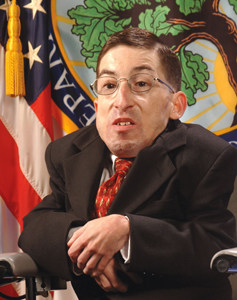
Recent Comments
Sue on Controller Recall Puts SmartDrive Safety in the Spotlight
David Anderson on Phoenix i is the First Wheelchair with Integrated Power Assist
Dan on Phoenix i is the First Wheelchair with Integrated Power Assist